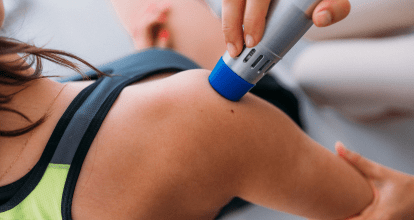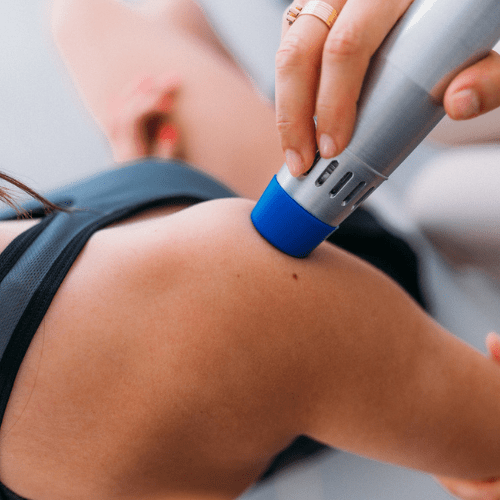
Featured Doctor
Eliana Cardozo, DO
Dr. Eliana Cardozo is a fellowship-trained sports & spine physiatrist at Orthopaedic & Neurosurgery Specialists.
View Profile

Shockwave therapy is a non-invasive treatment using high-energy sound waves to promote healing, reduce pain, and accelerate recovery for orthopedic conditions. In this Q&A, ONS sports and spine physiatrist Dr. Eliana Cardozo explains how it works, which conditions it treats, and what patients can expect during treatment.
What is shockwave therapy, and how does it work to treat orthopedic conditions?
Shockwave therapy uses high-energy sound waves to stimulate healing in damaged tissues. These sound waves can increase blood flow, promote collagen production, and break down calcified deposits, accelerating recovery and reducing pain. These sound waves are much stronger than those used in regular ultrasound, with about 1,000 times more pressure. Initially used to break up kidney stones, shockwave therapy also works well for treating orthopedic issues, like tendon wear and tear (tendinopathies). The two main types of shockwave therapy used for these conditions are radial and focal. Radial uses low energy sound waves for more superficial tissues, while focal is high energy for deeper tissues.
Which specific conditions or injuries is shockwave therapy most effective for?
Shockwave therapy is commonly used to treat a variety of painful conditions that affect muscles, tendons, and joints, including:
- Plantar Fasciitis (Heel pain)
- Achilles Tendinopathy (Back of ankle pain)
- Tennis Elbow/Golfer’s Elbow (Outer or inner elbow pain)
- Proximal Hamstring Tendinopathy (Upper hamstring pain)
- Greater Trochanteric Pain Syndrome (Outer hip pain)
- Rotator Cuff Tendinopathy (Shoulder tendon pain)
There is also emerging evidence for other diagnoses such as myofascial pain (muscle pain).
What made you start recommending shockwave therapy to your patients?
Shockwave is one of the tools I have in my practice to help my patients feel better and return to their activities. I like to use shockwave therapy for patients who have not seen sufficient improvement with standard treatments, such as physical therapy, particularly for stubborn tendon issues. One of the advantages of this treatment is that there is little downtime, and most people may continue with their activities while undergoing treatment.
What should patients expect during a typical shockwave therapy session?
Sessions last about 15 minutes. Most patients feel mild to moderate discomfort. There is little to no downtime after, and most people feel some level of improvement after each session.
Is shockwave therapy painful, and are there any side effects?
It’s uncomfortable but not painful. We can also adjust the settings to patient comfort. The main side effects are redness at the site and sometimes mild bruising.
How long does it take to see results, and how many sessions are usually needed?
The number of sessions needed depends on the individual’s condition and how long it has been present. Milder, less chronic issues often improve with fewer sessions, but patients can generally expect to undergo 3 to 6 sessions in total.
Who is an ideal candidate for shockwave therapy?
It’s best to talk to your ONS physician, but in general, patients that have not improved enough from usual conservative treatments for tendon issues can benefit from shockwave. It’s also an excellent option for individuals training for a sporting event who want to optimize their recovery and improvement within a specific timeline.
Can shockwave therapy be combined with other treatments like physical therapy or injections?
Shockwave can and should be combined with other treatments which can include physical therapy and certain types of injections. However, we do not combine shockwave therapy with corticosteroid injections. Typically, a waiting period of five weeks is recommended between a steroid injection and the start of shockwave therapy.
How can patients learn more or determine if shockwave therapy is right for them?
Schedule an appointment with one of our ONS physicians to explore if shockwave therapy is the right option for you by calling (203) 869-1145.


